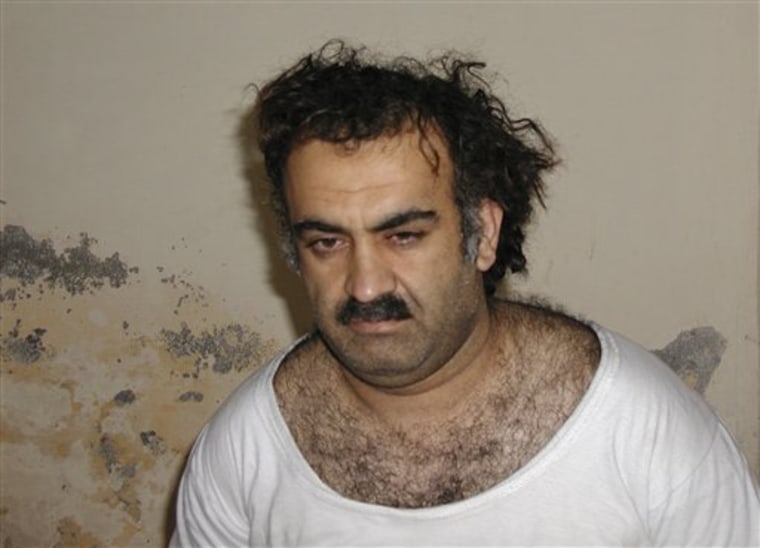Confessed Sept. 11 mastermind Khalid Sheikh Mohammed offered Monday to help persuade one of his co-defendants to leave his prison cell for a pretrial hearing at Guantanamo Bay.
Mohammed volunteered to reach out to Ramzi Binalshibh after the military judge overseeing the case suggested that he might offer a separate trial for Binalshibh, who has refused to appear with his four co-defendants in America's most important war-crimes trial since the close of World War II.
Judge Ralph Kohlmann, a Marine colonel, permitted Mohammed and the other co-defendants to send notes to Binalshibh. If the Yemeni still refuses to appear in court on Tuesday morning, Binalshibh will be dragged from his cell, Kohlmann said.
"It is my hope that perhaps we can avoid the need for a forcible bringing of him here," the judge said.
Wrote letters urging him to appear
Mohammed, sporting a bushy gray beard, chatted with his fellow defendants during a lull in the proceedings. He said through his attorney that he was offering to help because he wants Binalshibh in the courtroom. The other co-defendants agreed, and all four wrote letters urging Binalshibh to appear.
"I agree with my brother Khalid Sheikh Mohammed," said Waleed bin Attash, adding that Binalshibh "doesn't trust anybody in the government but he does trust us."
Kohlmann initially rejected the prosecution's request to order Binalshibh to appear, saying it failed to show a "compelling need," said Air Force Maj. Gail Crawford, a spokeswoman for the tribunals.
He changed his mind after prosecutors protested that the government has authority to order a detainee into a courtroom, but the detention center would not comply unless they had authorization from the judge.
"Nobody wants to take responsibility for forcibly extracting an individual," said Binalshibh's Pentagon-appointed attorney, Navy Cmdr. Suzanne Lachelier.
The five defendants were transferred to this U.S. Navy base in southeast Cuba from CIA custody in September 2006. A date has not been set for their trial; each faces possible execution if convicted.
Detainees not required to attend
The rules for the Pentagon's specially designed tribunal system do not require the detainees to attend these proceedings. Their arraignment occurred in June.
But prosecutors say they want all detainees to attend all of their sessions.
"We are the rule-of-law people, and our responsibility is to have the fairest trial," said Army Col. Lawrence Morris, the chief prosecutor for the Guantanamo tribunals.
Prosecutors say Binalshibh helped the Sept. 11 hijackers enter the United States and find flight schools.
His lawyers say he has been prescribed with medication that is used to treat schizophrenia, and they urged the judge to halt the proceedings until psychiatrists determine whether he is competent to stand trial.
The judge denied that request but said he will consider trying Binalshibh separately to keep his case from slowing down the joint trial.
